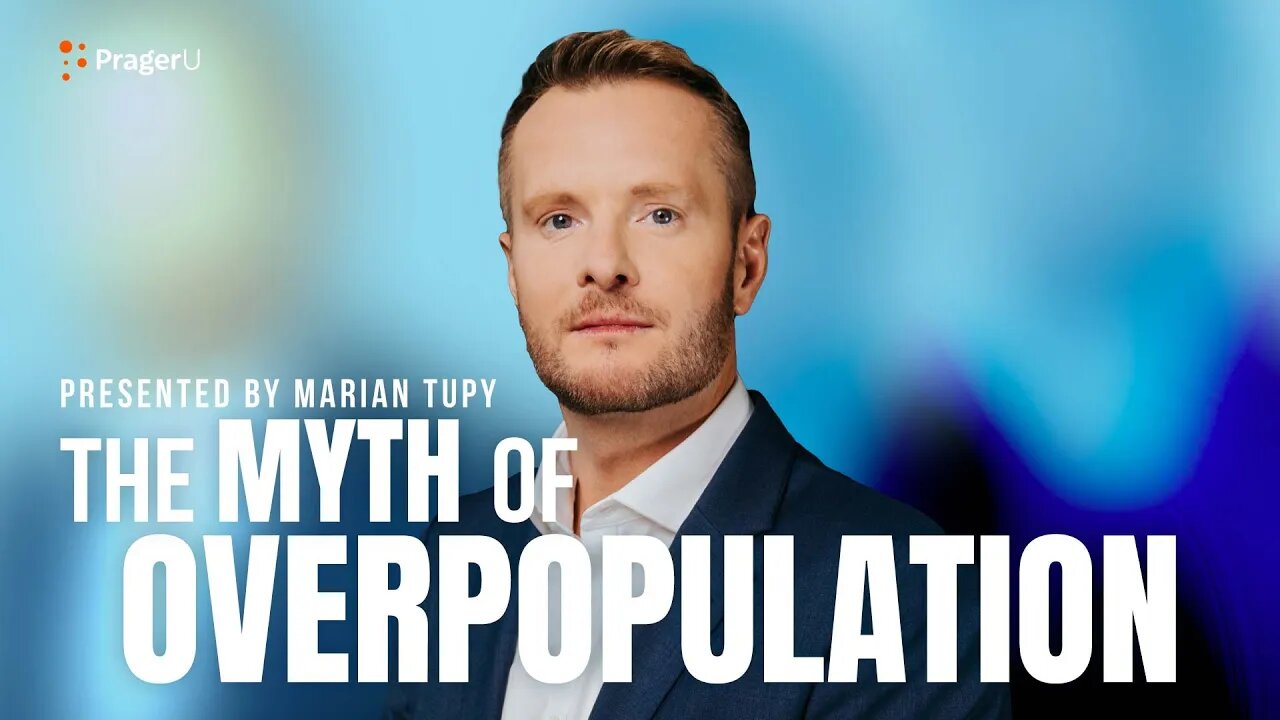Premium Only Content

The Myth of Overpopulation
There are now eight billion people living on the planet. Is there enough room for all of us? Are we going to run out of food and other resources? Marian Tupy, Senior Fellow at the Cato Institute and co-author of Superabundance, examines whether or not these fears are valid. His answer may surprise you.
SUBSCRIBE 👉 https://www.prageru.com/join
Script:
There are now eight billion people living on the planet.
Is there enough room for all of us? Aren’t we going to run out of natural resources? How are we going to feed everybody?
These are not new questions. Doomsayers have been asking them for at least 200 years.
In 1798, an English economist named Thomas Malthus, wrote his famous Essay on the Principle of Population. In it, Malthus claimed that population grew exponentially, while resources needed to feed that population grew at a linear rate.
The difference between the two growth rates, he argued, must lead to starvation.
Malthus was wrong. And not by a little; by a lot. As the population grew, food production improved … and so did almost everything else.
Consider the life of a typical American blue-collar worker over the span of a century. Using a unit of measurement known as time prices, we can estimate the amount of time someone would have to work to buy a given item.
Between 1900 and 2018, the length of time our blue-collar worker had to work to earn enough money to buy a pound of pork fell by 98%, to buy a pound of rice by 97%, to buy a pound of coffee, 94%.
While people can’t eat rubber, aluminum, or cotton, these commodities are valuable inputs in the production processes that impact the prices of goods and services, and hence the overall standard of living. Their prices fell by 99%, 98% and 96% respectively — while the population of the United States rose from 76 million to 328 million.
Famines, which were once common, have disappeared outside of war zones. In much of the world today, it’s obesity not starvation, that’s a problem.
This relationship between population growth and abundance may seem counterintuitive, but it’s true.
Remember this chart that so frightened Malthus? The reality looks very different.
The more people we have, the more abundance we have. Relative to previous generations, we now live in a world of superabundance — the term that my colleague and co-author, Gale Pooley and I have coined and use as the title of our book.
What makes this superabundance possible?
The answer is knowledge.
Thomas Sowell, the brilliant Hoover Institution economist, explains it this way:
The difference in the standard of living between the cavemen and us is not natural resources. The difference is knowledge. We have a lot more of it. And we use that knowledge to make things from the same natural resources that existed during the time of the cavemen, but which the caveman could never have imagined.
Let’s look at something as simple as a grain of sand. It has been lying around for billions of years. Then, some 4,500 years ago, someone figured out that by heating sand to just over 3,000 degrees Fahrenheit, sand could be turned into glass beads, then glass jars, and much later, windowpanes.
With every step of discovery, the value produced from a grain of sand increased. Today, we use glass in fiber optic cables and computer microchips, turbocharging our productivity, thus making us much more prosperous than our ancestors.
Counting the quantity of known raw materials, like Malthus and many other people have done, might seem logical, but it misses the ingredient that changes everything: knowledge.
And new knowledge emerges from the human mind. A newborn comes into the world not only with an empty stomach, but also a brain capable of intelligent, potentially world-changing thought.
So, what really matters is not the finite number of atoms on the planet, be they of copper or zinc or any other element, but the human ability to combine and recombine those atoms in ever more valuable ways.
Therefore, we can confidently say that economic growth is less about resources, which are limited, and more about knowledge, which is limitless.
As the Nobel Prize-winning economist Paul Romer put it, new ideas “do not add up. They multiply.”
For the full script, visit: https://www.prageru.com/video/the-myth-of-overpopulation
-
 5:31
5:31
PragerU
2 days agoJoe Biden: Decline and Fall | 5-Minute Videos | PragerU
2.95K9 -
 LIVE
LIVE
XDDX_HiTower
1 hour agoBATTLEFIELD 6 REDSEC! [RGMT CONTENT Mgr.
38 watching -
 LIVE
LIVE
Joker Effect
41 minutes agoSTREAMER NEWS: What actually occurred at Dreamhack ATL. Frontier Airlines. Kick Staff Trolled me?!
468 watching -
 LIVE
LIVE
VapinGamers
52 minutes agoBF6 RedSpec - Nothing but Wins and New Rum Bot Testing - !rumbot !music
14 watching -
 1:01:50
1:01:50
MattMorseTV
3 hours ago $0.01 earned🔴Now he’s literally BEGGING for a DEAL. 🔴
23K36 -
 LIVE
LIVE
Cewpins
37 minutes agoWEED PORN *unboxing*🔥World Wide !weed Review🍃420💨!MJ
41 watching -
 1:00:02
1:00:02
BonginoReport
4 hours agoBlue Wave Crashes Over The Nation On Election Night - Nightly Scroll w/ Hayley Caronia (Ep.171)
117K63 -
 5:49
5:49
Buddy Brown
8 hours agoTake a Look at the Outdoor MOSQUES in TIMES SQUARE after MAMDANI Win | Buddy Brown
22K19 -
 18:15
18:15
ArynneWexler
5 hours agoThe Fall of New York - How Zohran Mamdani Won | NN8
16.3K11 -
 1:30:53
1:30:53
Kim Iversen
5 hours agoAmerica Under INVASION - Sharia Law Wins In New York City?
110K291